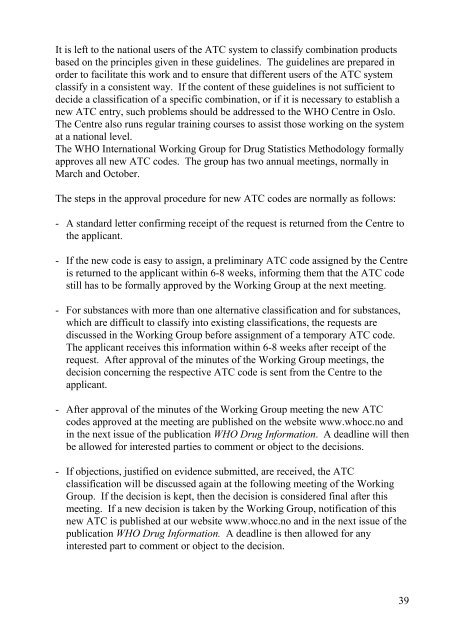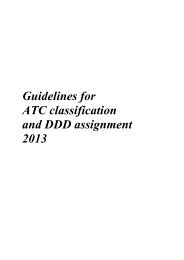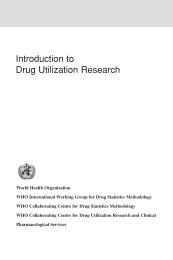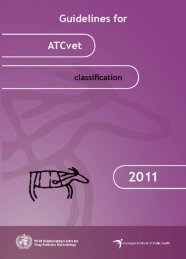Guidelines for ATC classification and DDD assignment - WHOCC
Guidelines for ATC classification and DDD assignment - WHOCC
Guidelines for ATC classification and DDD assignment - WHOCC
You also want an ePaper? Increase the reach of your titles
YUMPU automatically turns print PDFs into web optimized ePapers that Google loves.
It is left to the national users of the <strong>ATC</strong> system to classify combination products<br />
based on the principles given in these guidelines. The guidelines are prepared in<br />
order to facilitate this work <strong>and</strong> to ensure that different users of the <strong>ATC</strong> system<br />
classify in a consistent way. If the content of these guidelines is not sufficient to<br />
decide a <strong>classification</strong> of a specific combination, or if it is necessary to establish a<br />
new <strong>ATC</strong> entry, such problems should be addressed to the WHO Centre in Oslo.<br />
The Centre also runs regular training courses to assist those working on the system<br />
at a national level.<br />
The WHO International Working Group <strong>for</strong> Drug Statistics Methodology <strong>for</strong>mally<br />
approves all new <strong>ATC</strong> codes. The group has two annual meetings, normally in<br />
March <strong>and</strong> October.<br />
The steps in the approval procedure <strong>for</strong> new <strong>ATC</strong> codes are normally as follows:<br />
- A st<strong>and</strong>ard letter confirming receipt of the request is returned from the Centre to<br />
the applicant.<br />
- If the new code is easy to assign, a preliminary <strong>ATC</strong> code assigned by the Centre<br />
is returned to the applicant within 6-8 weeks, in<strong>for</strong>ming them that the <strong>ATC</strong> code<br />
still has to be <strong>for</strong>mally approved by the Working Group at the next meeting.<br />
- For substances with more than one alternative <strong>classification</strong> <strong>and</strong> <strong>for</strong> substances,<br />
which are difficult to classify into existing <strong>classification</strong>s, the requests are<br />
discussed in the Working Group be<strong>for</strong>e <strong>assignment</strong> of a temporary <strong>ATC</strong> code.<br />
The applicant receives this in<strong>for</strong>mation within 6-8 weeks after receipt of the<br />
request. After approval of the minutes of the Working Group meetings, the<br />
decision concerning the respective <strong>ATC</strong> code is sent from the Centre to the<br />
applicant.<br />
- After approval of the minutes of the Working Group meeting the new <strong>ATC</strong><br />
codes approved at the meeting are published on the website www.whocc.no <strong>and</strong><br />
in the next issue of the publication WHO Drug In<strong>for</strong>mation. A deadline will then<br />
be allowed <strong>for</strong> interested parties to comment or object to the decisions.<br />
- If objections, justified on evidence submitted, are received, the <strong>ATC</strong><br />
<strong>classification</strong> will be discussed again at the following meeting of the Working<br />
Group. If the decision is kept, then the decision is considered final after this<br />
meeting. If a new decision is taken by the Working Group, notification of this<br />
new <strong>ATC</strong> is published at our website www.whocc.no <strong>and</strong> in the next issue of the<br />
publication WHO Drug In<strong>for</strong>mation. A deadline is then allowed <strong>for</strong> any<br />
interested part to comment or object to the decision.<br />
39





